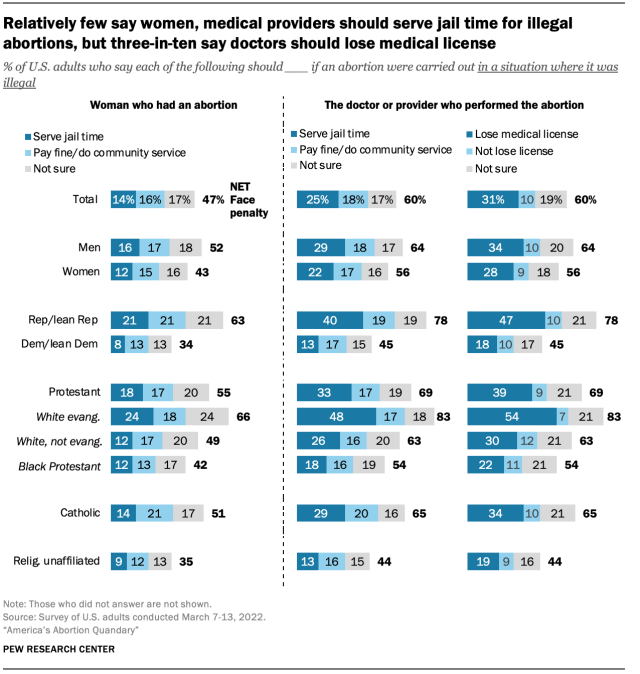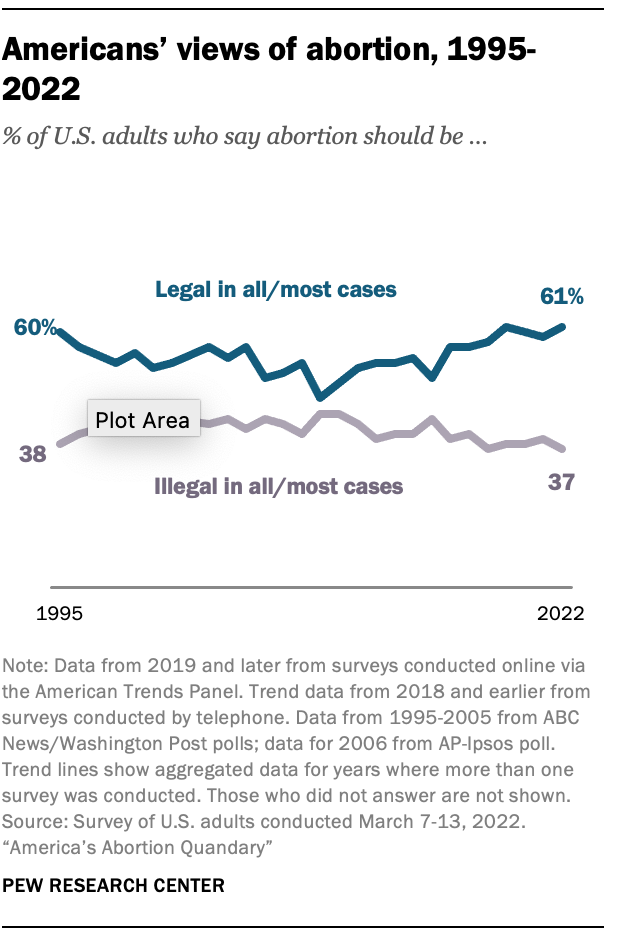
As the long-running debate over abortion reaches another key moment at the Supreme Court and in state legislatures across the country, a majority of U.S. adults continue to say that abortion should be legal in all or most cases. About six-in-ten Americans (61%) say abortion should be legal in “all” or “most” cases, while 37% think abortion should be illegal in all or most cases. These views have changed little over the past several years: In 2019, for example, 61% of adults said abortion should be legal in all or most cases, while 38% said it should be illegal in all or most cases.
Most respondents in the new survey took one of the middle options when first asked about their views on abortion, saying either that abortion should be legal in most cases (36%) or illegal in most cases (27%).
Respondents who said abortion should either be legal in all cases or illegal in all cases received a follow-up question asking whether there should be any exceptions to such laws. Overall, 25% of adults initially said abortion should be legal in all cases, but about a quarter of this group (6% of all U.S. adults) went on to say that there should be some exceptions when abortion should be against the law.
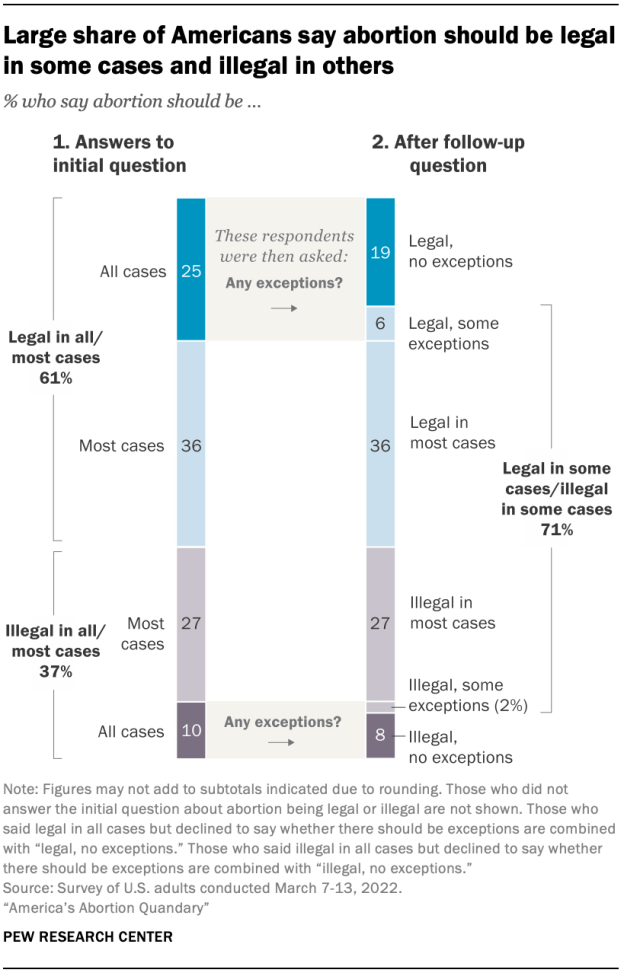
One-in-ten adults initially answered that abortion should be illegal in all cases, but about one-in-five of these respondents (2% of all U.S. adults) followed up by saying that there are some exceptions when abortion should be permitted.
Altogether, seven-in-ten Americans say abortion should be legal in some cases and illegal in others, including 42% who say abortion should be generally legal, but with some exceptions, and 29% who say it should be generally illegal, except in certain cases. Much smaller shares take absolutist views when it comes to the legality of abortion in the U.S., maintaining that abortion should be legal in all cases with no exceptions (19%) or illegal in all circumstances (8%).
There is a modest gender gap in views of whether abortion should be legal, with women slightly more likely than men to say abortion should be legal in all cases or in all cases but with some exceptions (63% vs. 58%).
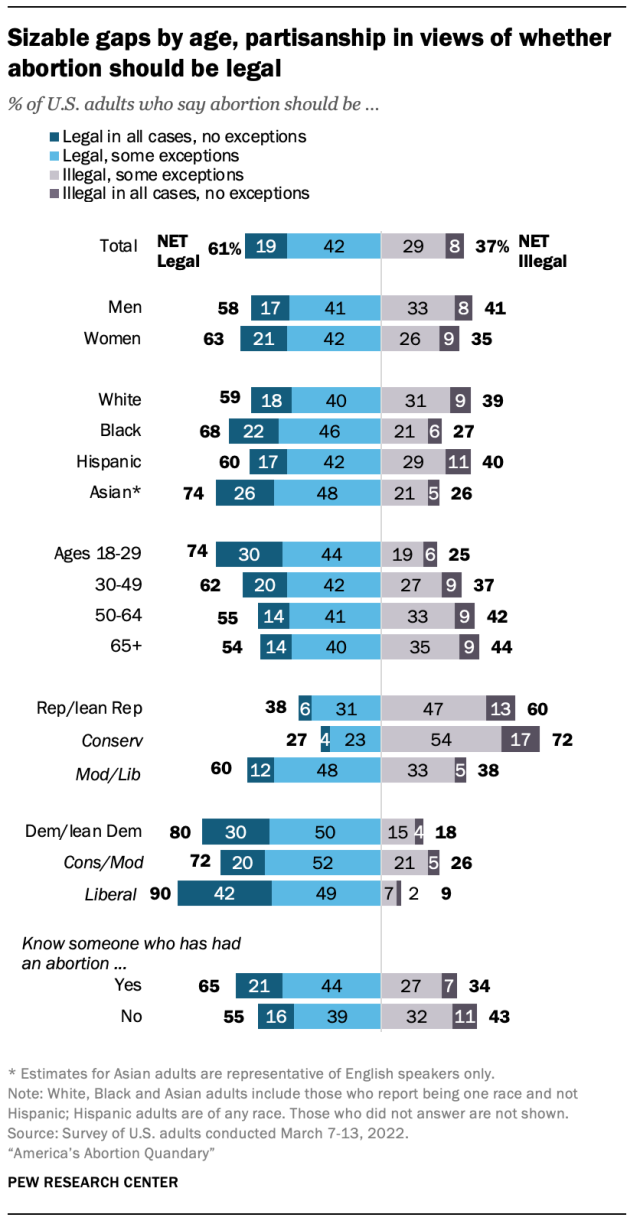
Younger adults are considerably more likely than older adults to say abortion should be legal: Three-quarters of adults under 30 (74%) say abortion should be generally legal, including 30% who say it should be legal in all cases without exception.
But there is an even larger gap in views toward abortion by partisanship: 80% of Democrats and Democratic-leaning independents say abortion should be legal in all or most cases, compared with 38% of Republicans and GOP leaners. Previous Center research has shown this gap widening over the past 15 years.
Still, while partisans diverge in views of whether abortion should mostly be legal or illegal, most Democrats and Republicans do not view abortion in absolutist terms. Just 13% of Republicans say abortion should be against the law in all cases without exception; 47% say it should be illegal with some exceptions. And while three-in-ten Democrats say abortion should be permitted in all circumstances, half say it should mostly be legal – but with some exceptions.
There also are sizable divisions within both partisan coalitions by ideology. For instance, while a majority of moderate and liberal Republicans say abortion should mostly be legal (60%), just 27% of conservative Republicans say the same. Among Democrats, self-described liberals are twice as apt as moderates and conservatives to say abortion should be legal in all cases without exception (42% vs. 20%).
Regardless of partisan affiliation, adults who say they personally know someone who has had an abortion – such as a friend, relative or themselves – are more likely to say abortion should be legal than those who say they do not know anyone who had an abortion.
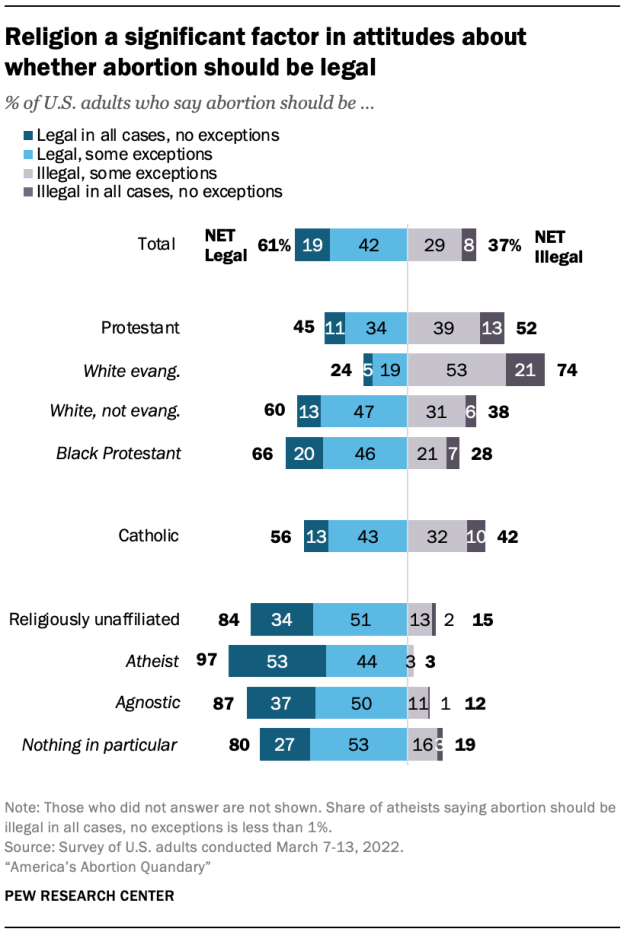
Views toward abortion also vary considerably by religious affiliation – specifically among large Christian subgroups and religiously unaffiliated Americans.
For example, roughly three-quarters of White evangelical Protestants say abortion should be illegal in all or most cases. This is far higher than the share of White non-evangelical Protestants (38%) or Black Protestants (28%) who say the same.
Despite Catholic teaching on abortion, a slim majority of U.S. Catholics (56%) say abortion should be legal. This includes 13% who say it should be legal in all cases without exception, and 43% who say it should be legal, but with some exceptions.
Compared with Christians, religiously unaffiliated adults are far more likely to say abortion should be legal overall – and significantly more inclined to say it should be legal in all cases without exception. Within this group, atheists stand out: 97% say abortion should be legal, including 53% who say it should be legal in all cases without exception. Agnostics and those who describe their religion as “nothing in particular” also overwhelmingly say that abortion should be legal, but they are more likely than atheists to say there are some circumstances when abortion should be against the law.
Although the survey was conducted among Americans of many religious backgrounds, including Jews, Muslims, Buddhists and Hindus, it did not obtain enough respondents from non-Christian groups to report separately on their responses.
Abortion at various stages of pregnancy
As a growing number of states debate legislation to restrict abortion – often after a certain stage of pregnancy – Americans express complex views about when abortion should generally be legal and when it should be against the law. Overall, a majority of adults (56%) say that how long a woman has been pregnant should matter in determining when abortion should be legal, while far fewer (14%) say that this should not be a factor. An additional one-quarter of the public says that abortion should either be legal (19%) or illegal (8%) in all circumstances without exception; these respondents did not receive this question.
Among men and women, Republicans and Democrats, and Christians and religious “nones” who do not take absolutist positions about abortion on either side of the debate, the prevailing view is that the stage of the pregnancy should be a factor in determining whether abortion should be legal.
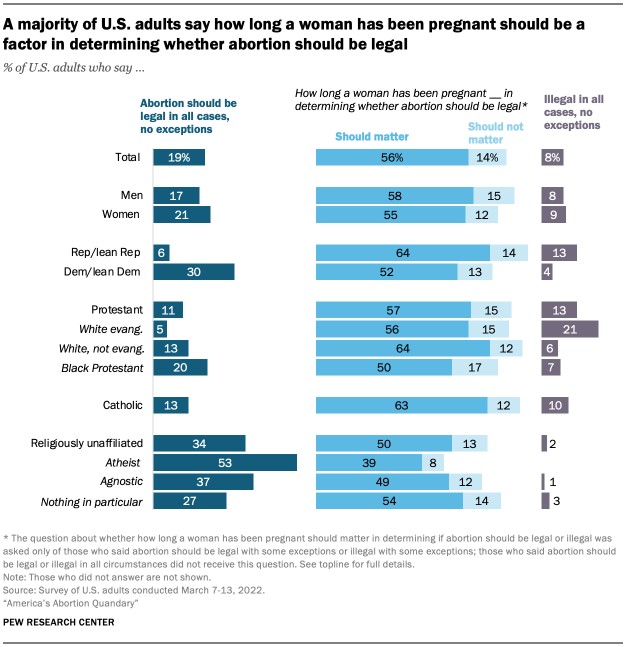
Americans broadly are more likely to favor restrictions on abortion later in pregnancy than earlier in pregnancy. Many adults also say the legality of abortion depends on other factors at every stage of pregnancy.
Overall, a plurality of adults (44%) say that abortion should be legal six weeks into a pregnancy, which is about when cardiac activity (sometimes called a fetal heartbeat) may be detected and before many women know they are pregnant; this includes 19% of adults who say abortion should be legal in all cases without exception, as well as 25% of adults who say it should be legal at that point in a pregnancy. An additional 7% say abortion generally should be legal in most cases, but that the stage of the pregnancy should not matter in determining legality.1
One-in-five Americans (21%) say abortion should be illegal at six weeks. This includes 8% of adults who say abortion should be illegal in all cases without exception as well as 12% of adults who say that abortion should be illegal at this point. Additionally, 6% say abortion should be illegal in most cases and how long a woman has been pregnant should not matter in determining abortion’s legality. Nearly one-in-five respondents, when asked whether abortion should be legal six weeks into a pregnancy, say “it depends.”
Americans are more divided about what should be permitted 14 weeks into a pregnancy – roughly at the end of the first trimester – although still, more people say abortion should be legal at this stage (34%) than illegal (27%), and about one-in-five say “it depends.”
Fewer adults say abortion should be legal 24 weeks into a pregnancy – about when a healthy fetus could survive outside the womb with medical care. At this stage, 22% of adults say abortion should be legal, while nearly twice as many (43%) say it should be illegal. Again, about one-in-five adults (18%) say whether abortion should be legal at 24 weeks depends on other factors.
Respondents who said that abortion should be illegal 24 weeks into a pregnancy or that “it depends” were asked a follow-up question about whether abortion at that point should be legal if the pregnant woman’s life is in danger or the baby would be born with severe disabilities. Most who received this question say abortion in these circumstances should be legal (54%) or that it depends on other factors (40%). Just 4% of this group maintained that abortion should be illegal in this case.
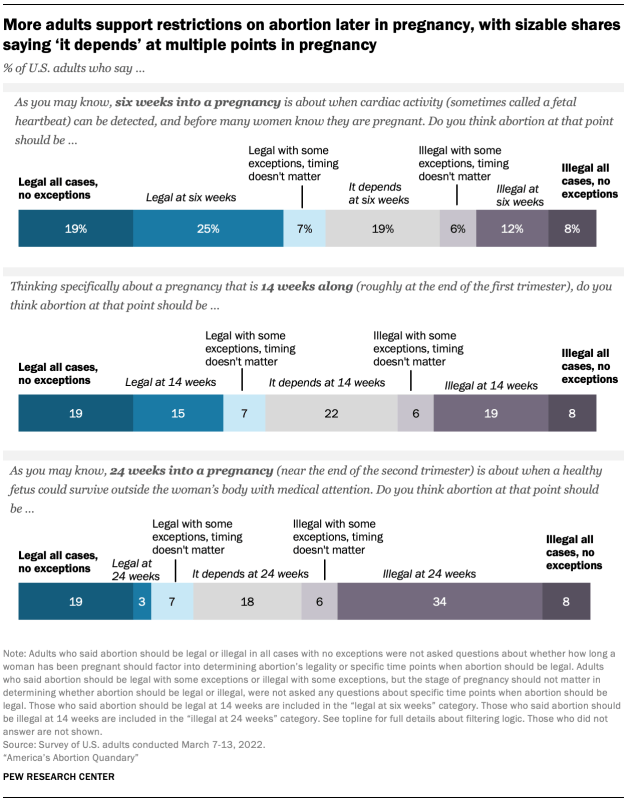
This pattern in views of abortion – whereby more favor greater restrictions on abortion as a pregnancy progresses – is evident across a variety of demographic and political groups.
Democrats are far more likely than Republicans to say that abortion should be legal at each of the three stages of pregnancy asked about on the survey. For example, while 26% of Republicans say abortion should be legal at six weeks of pregnancy, more than twice as many Democrats say the same (61%). Similarly, while about a third of Democrats say abortion should be legal at 24 weeks of pregnancy, just 8% of Republicans say the same.
However, neither Republicans nor Democrats uniformly express absolutist views about abortion throughout a pregnancy. Republicans are divided on abortion at six weeks: Roughly a quarter say it should be legal (26%), while a similar share say it depends (24%). A third say it should be illegal.
Democrats are divided about whether abortion should be legal or illegal at 24 weeks, with 34% saying it should be legal, 29% saying it should be illegal, and 21% saying it depends.
There also is considerable division among each partisan group by ideology. At six weeks of pregnancy, just one-in-five conservative Republicans (19%) say that abortion should be legal; moderate and liberal Republicans are twice as likely as their conservative counterparts to say this (39%).
At the same time, about half of liberal Democrats (48%) say abortion at 24 weeks should be legal, while 17% say it should be illegal. Among conservative and moderate Democrats, the pattern is reversed: A plurality (39%) say abortion at this stage should be illegal, while 24% say it should be legal.
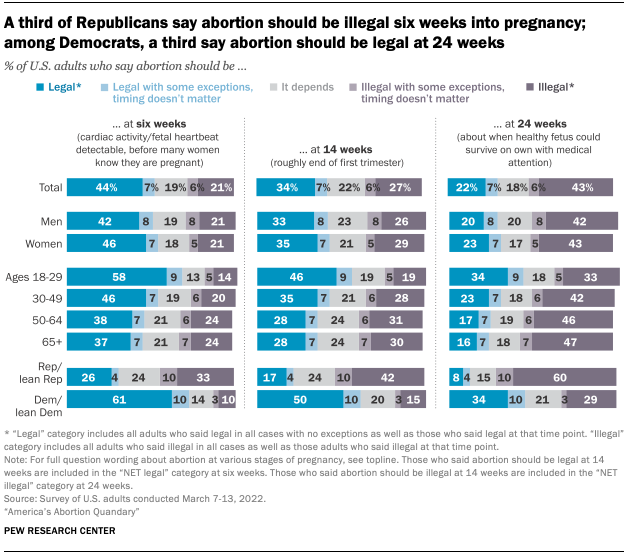
Christian adults are far less likely than religiously unaffiliated Americans to say abortion should be legal at each stage of pregnancy.
Among Protestants, White evangelicals stand out for their opposition to abortion. At six weeks of pregnancy, for example, 44% say abortion should be illegal, compared with 17% of White non-evangelical Protestants and 15% of Black Protestants. This pattern also is evident at 14 and 24 weeks of pregnancy, when half or more of White evangelicals say abortion should be illegal.
At six weeks, a plurality of Catholics (41%) say abortion should be legal, while smaller shares say it depends or it should be illegal. But by 24 weeks, about half of Catholics (49%) say abortion should be illegal.
Among adults who are religiously unaffiliated, atheists stand out for their views. They are the only group in which a sizable majority says abortion should be legal at each point in a pregnancy. Even at 24 weeks, 62% of self-described atheists say abortion should be legal, compared with smaller shares of agnostics (43%) and those who say their religion is “nothing in particular” (31%).
As is the case with adults overall, most religiously affiliated and religiously unaffiliated adults who originally say that abortion should be illegal or “it depends” at 24 weeks go on to say either it should be legal or it depends if the pregnant woman’s life is in danger or the baby would be born with severe disabilities. Few (4% and 5%, respectively) say abortion should be illegal at 24 weeks in these situations.
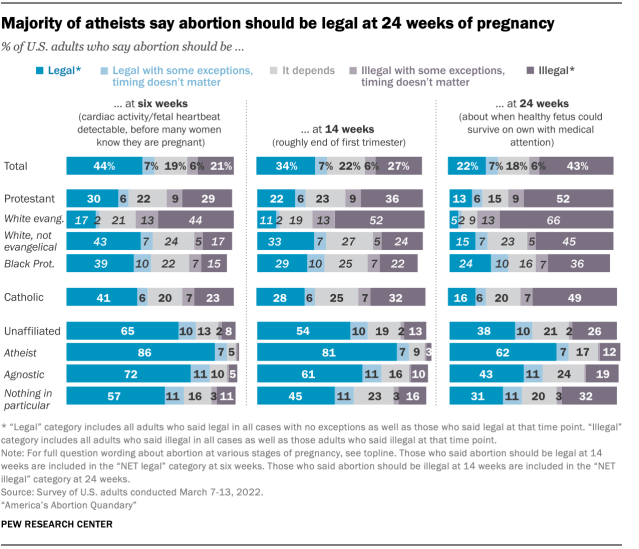
Abortion and circumstances of pregnancy
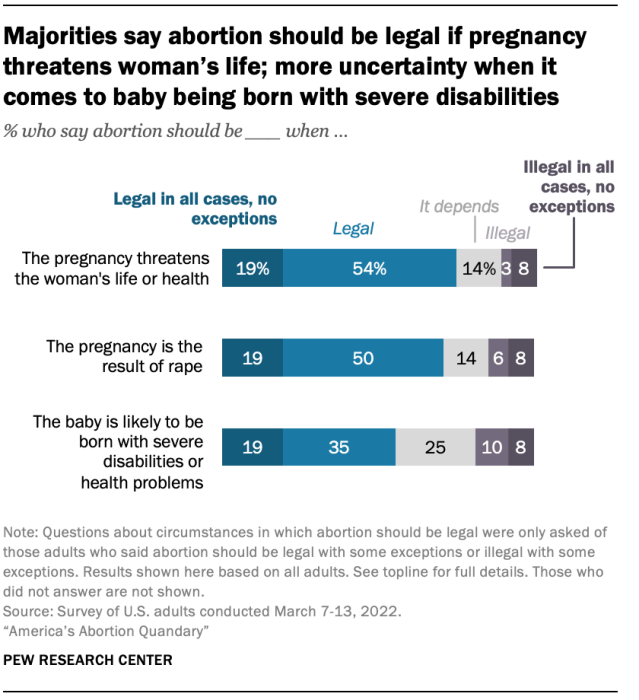
The stage of the pregnancy is not the only factor that shapes people’s views of when abortion should be legal. Sizable majorities of U.S. adults say that abortion should be legal if the pregnancy threatens the life or health of the pregnant woman (73%) or if pregnancy is the result of rape (69%).
There is less consensus when it comes to circumstances in which a baby may be born with severe disabilities or health problems: 53% of Americans overall say abortion should be legal in such circumstances, including 19% who say abortion should be legal in all cases and 35% who say there are some situations where abortions should be illegal, but that it should be legal in this specific type of case. A quarter of adults say “it depends” in this situation, and about one-in-five say it should be illegal (10% who say illegal in this specific circumstance and 8% who say illegal in all circumstances).
There are sizable divides between and among partisans when it comes to views of abortion in these situations. Overall, Republicans are less likely than Democrats to say abortion should be legal in each of the three circumstances outlined in the survey. However, both partisan groups are less likely to say abortion should be legal when the baby may be born with severe disabilities or health problems than when the woman’s life is in danger or the pregnancy is the result of rape.
Just as there are wide gaps among Republicans by ideology on whether how long a woman has been pregnant should be a factor in determining abortion’s legality, there are large gaps when it comes to circumstances in which abortions should be legal. For example, while a clear majority of moderate and liberal Republicans (71%) say abortion should be permitted when the pregnancy is the result of rape, conservative Republicans are more divided. About half (48%) say it should be legal in this situation, while 29% say it should be illegal and 21% say it depends.
The ideological gaps among Democrats are slightly less pronounced. Most Democrats say abortion should be legal in each of the three circumstances – just to varying degrees. While 77% of liberal Democrats say abortion should be legal if a baby will be born with severe disabilities or health problems, for example, a smaller majority of conservative and moderate Democrats (60%) say the same.
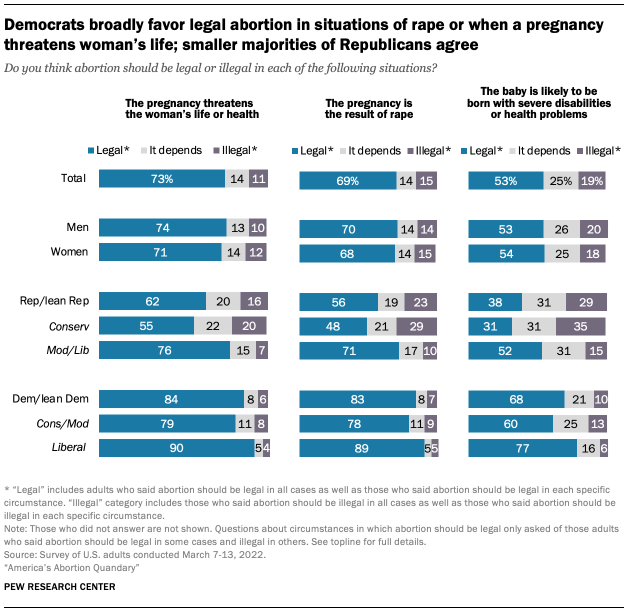
White evangelical Protestants again stand out for their views on abortion in various circumstances; they are far less likely than White non-evangelical or Black Protestants to say abortion should be legal across each of the three circumstances described in the survey.
While about half of White evangelical Protestants (51%) say abortion should be legal if a pregnancy threatens the woman’s life or health, clear majorities of other Protestant groups and Catholics say this should be the case. The same pattern holds in views of whether abortion should be legal if the pregnancy is the result of rape. Most White non-evangelical Protestants (75%), Black Protestants (71%) and Catholics (66%) say abortion should be permitted in this instance, while White evangelicals are more divided: 40% say it should be legal, while 34% say it should be illegal and about a quarter say it depends.
Mirroring the pattern seen among adults overall, opinions are more varied about a situation where a baby might be born with severe disabilities or health issues. For instance, half of Catholics say abortion should be legal in such cases, while 21% say it should be illegal and 27% say it depends on the situation.
Most religiously unaffiliated adults – including overwhelming majorities of self-described atheists – say abortion should be legal in each of the three circumstances.
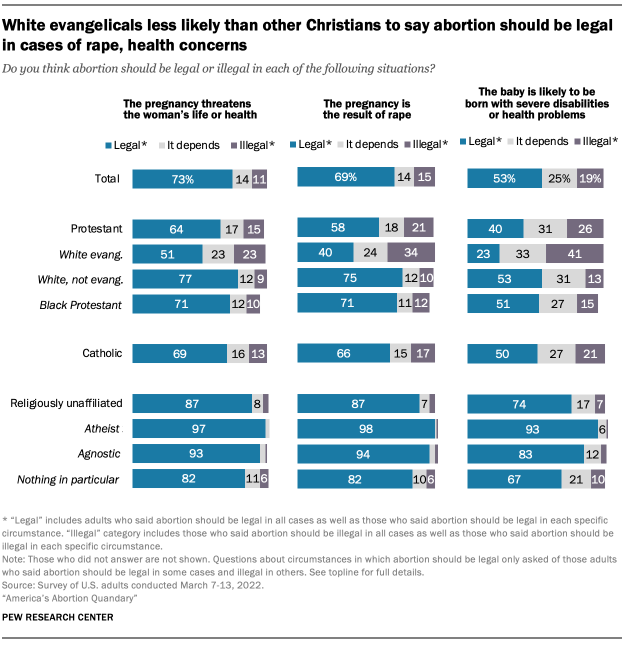
Parental notification for minors seeking abortion
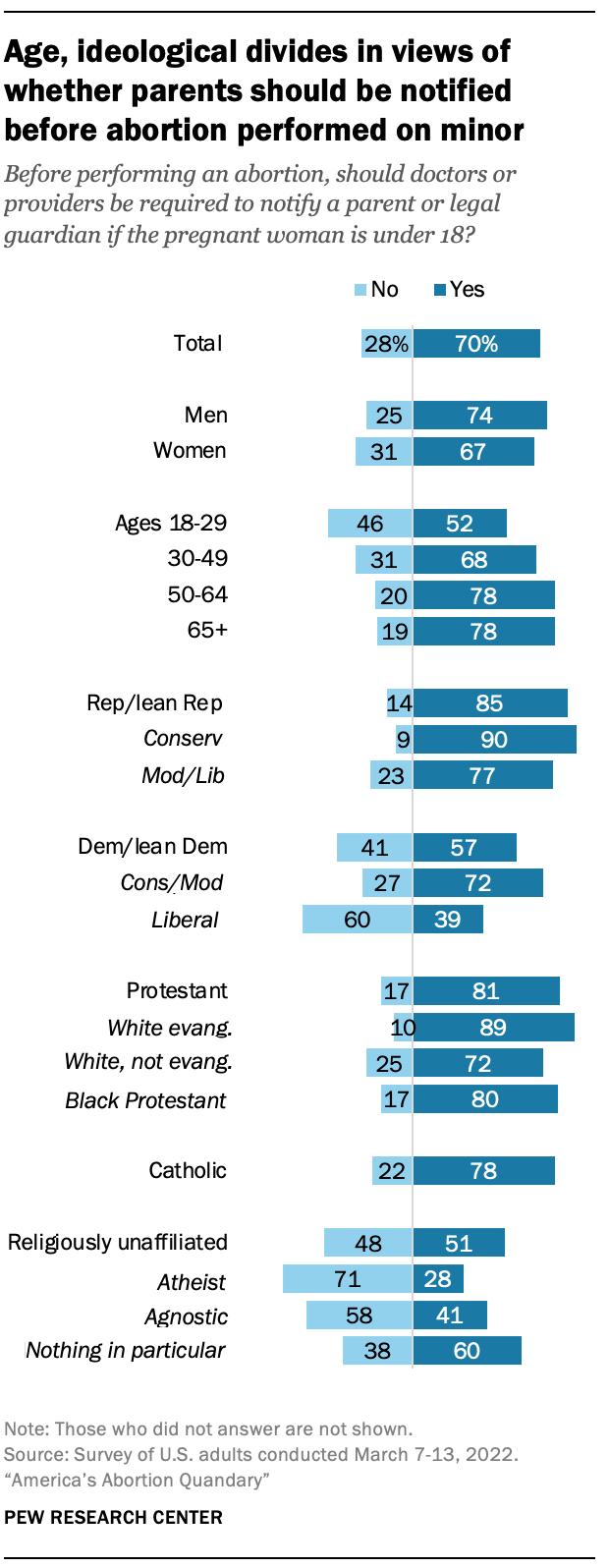
Seven-in-ten U.S. adults say that doctors or other health care providers should be required to notify a parent or legal guardian if the pregnant woman seeking an abortion is under 18, while 28% say they should not be required to do so.
Women are slightly less likely than men to say this should be a requirement (67% vs. 74%). And younger adults are far less likely than those who are older to say a parent or guardian should be notified before a doctor performs an abortion on a pregnant woman who is under 18. In fact, about half of adults ages 18 to 24 (53%) say a doctor should not be required to notify a parent. By contrast, 64% of adults ages 25 to 29 say doctors should be required to notify parents of minors seeking an abortion, as do 68% of adults ages 30 to 49 and 78% of those 50 and older.
A large majority of Republicans (85%) say that a doctor should be required to notify the parents of a minor before an abortion, though conservative Republicans are somewhat more likely than moderate and liberal Republicans to take this position (90% vs. 77%).
The ideological divide is even more pronounced among Democrats. Overall, a slim majority of Democrats (57%) say a parent should be notified in this circumstance, but while 72% of conservative and moderate Democrats hold this view, just 39% of liberal Democrats agree.
By and large, most Protestant (81%) and Catholic (78%) adults say doctors should be required to notify parents of minors before an abortion. But religiously unaffiliated Americans are more divided. Majorities of both atheists (71%) and agnostics (58%) say doctors should not be required to notify parents of minors seeking an abortion, while six-in-ten of those who describe their religion as “nothing in particular” say such notification should be required.
Penalties for abortions performed illegally
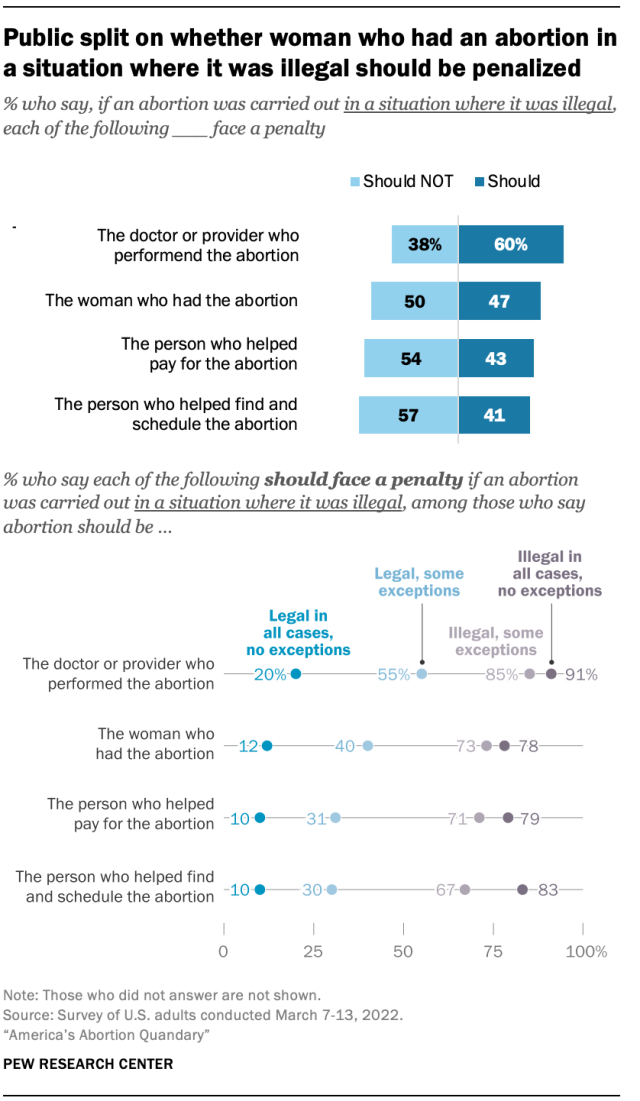
Americans are divided over who should be penalized – and what that penalty should be – in a situation where an abortion occurs illegally.
Overall, a 60% majority of adults say that if a doctor or provider performs an abortion in a situation where it is illegal, they should face a penalty. But there is less agreement when it comes to others who may have been involved in the procedure.
While about half of the public (47%) says a woman who has an illegal abortion should face a penalty, a nearly identical share (50%) says she should not. And adults are more likely to say people who help find and schedule or pay for an abortion in a situation where it is illegal should not face a penalty than they are to say they should.
Views about penalties are closely correlated with overall attitudes about whether abortion should be legal or illegal. For example, just 20% of adults who say abortion should be legal in all cases without exception think doctors or providers should face a penalty if an abortion were carried out in a situation where it was illegal. This compares with 91% of those who think abortion should be illegal in all cases without exceptions. Still, regardless of how they feel about whether abortion should be legal or not, Americans are more likely to say a doctor or provider should face a penalty compared with others involved in the procedure.
Among those who say medical providers and/or women should face penalties for illegal abortions, there is no consensus about whether they should get jail time or a less severe punishment. Among U.S. adults overall, 14% say women should serve jail time if they have an abortion in a situation where it is illegal, while 16% say they should receive a fine or community service and 17% say they are not sure what the penalty should be.
A somewhat larger share of Americans (25%) say doctors or other medical providers should face jail time for providing illegal abortion services, while 18% say they should face fines or community service and 17% are not sure. About three-in-ten U.S. adults (31%) say doctors should lose their medical license if they perform an abortion in a situation where it is illegal.
Men are more likely than women to favor penalties for the woman or doctor in situations where abortion is illegal. About half of men (52%) say women should face a penalty, while just 43% of women say the same. Similarly, about two-thirds of men (64%) say a doctor should face a penalty, while 56% of women agree.
Republicans are considerably more likely than Democrats to say both women and doctors should face penalties – including jail time. For example, 21% of Republicans say the woman who had the abortion should face jail time, and 40% say this about the doctor who performed the abortion. Among Democrats, far smaller shares say the woman (8%) or doctor (13%) should serve jail time.
White evangelical Protestants are more likely than other Protestant groups to favor penalties for abortions in situations where they are illegal. Fully 24% say the woman who had the abortion should serve time in jail, compared with just 12% of White non-evangelical Protestants or Black Protestants. And while about half of White evangelicals (48%) say doctors who perform illegal abortions should serve jail time, just 26% of White non-evangelical Protestants and 18% of Black Protestants share this view.
